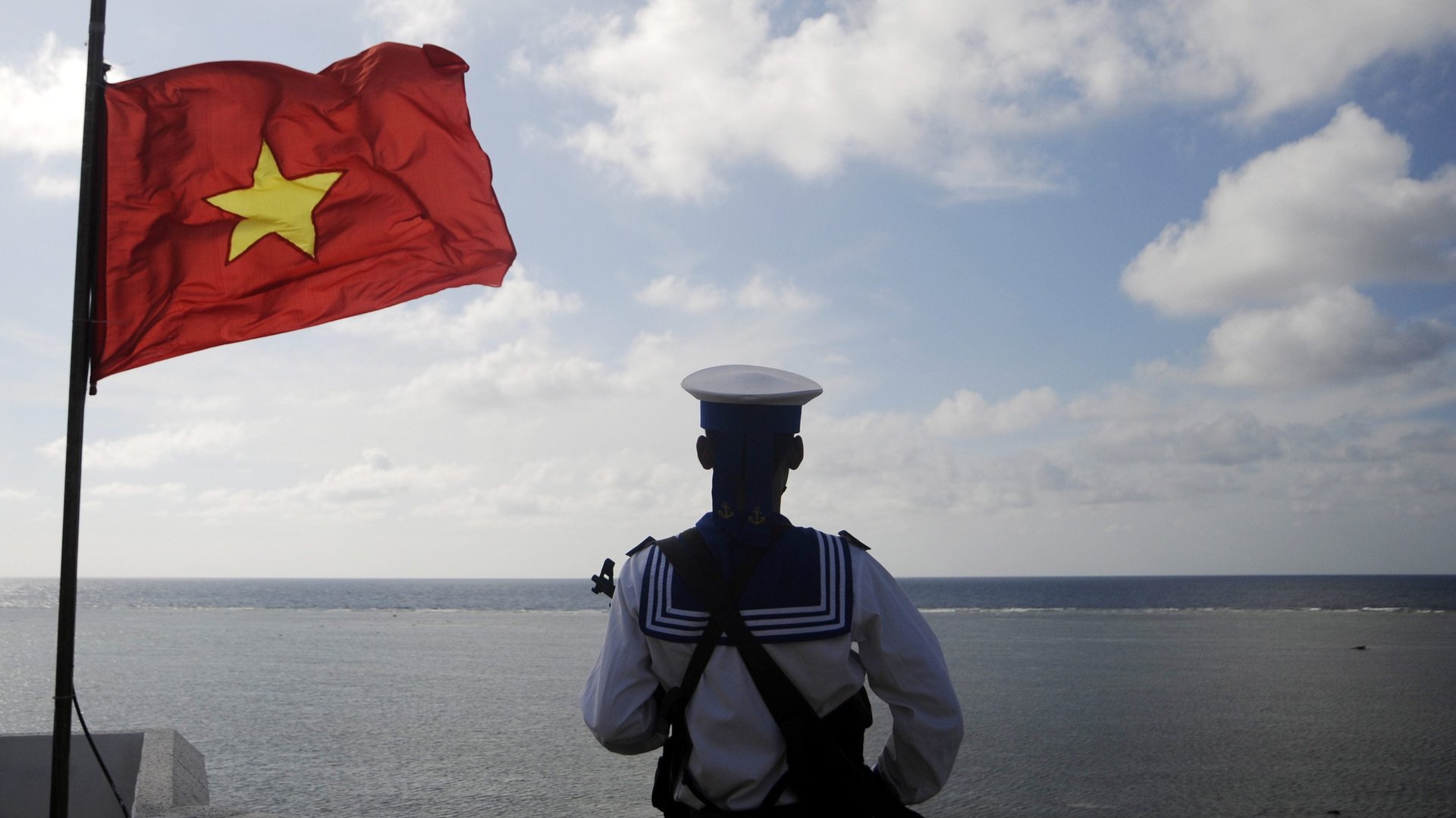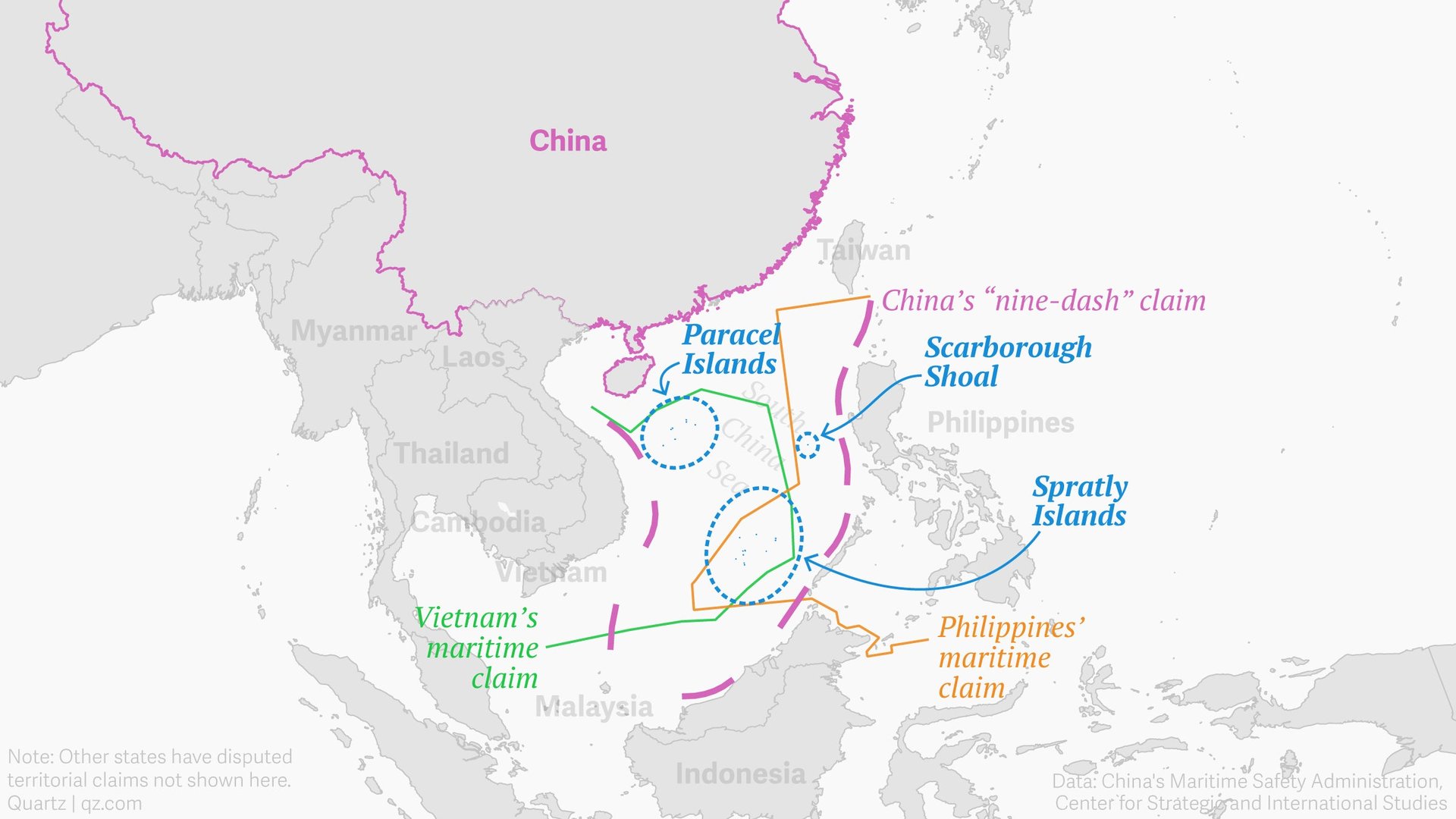The Philippines’ victory in the South China Sea could push neighboring countries to rein in China
Yesterday an international tribunal ruled decisively against the sweeping territorial claims that China has made in the South China Sea. Though the Philippines was the main victor, having filed the case in early 2013, other nations in the region may also benefit from the ruling.


Yesterday an international tribunal ruled decisively against the sweeping territorial claims that China has made in the South China Sea. Though the Philippines was the main victor, having filed the case in early 2013, other nations in the region may also benefit from the ruling.
The ruling has strong implications for other coastal states along the South China Sea, in particular Vietnam, Indonesia, and Malaysia, said Paul Reichler, a partner at US law firm Foley Hoag and the lead attorney for the Philippines in the case.
China bases its claims, and justifies its often aggressive behavior, on the “nine-dash line,” which was drawn on a 1940s map and encompasses most of the sea. Everything within it, Beijing insists, is Chinese territory, even if the line intersects with the exclusive economic zones (EEZs) granted to other nations under the United Nations Convention on the Law of the Sea (UNCLOS).

The ruling destroyed that argument. “If the nine-dash line is illegal, as it was declared to be today by the tribunal, then it’s just as illegal for China to apply it against Vietnam, Malaysia, and Indonesia, as it is illegal for China to apply it against the Philippines,” Reichler said after ruling.
After the ruling, “the other states in the region will be more inclined to… assert their rights more aggressively,” said Julian Ku, a professor at the law school of Hofstra University in New York. “You might see other countries file similar cases.”
China vs. Vietnam and Indonesia
There’s no guarantee that other countries will follow the Philippines’ example. China is a major source of trade and foreign investment for most of Southeast Asia. The Philippines’ victory has already sparked calls for boycotts in China of everything from dried mangoes to vacations.
But there are certainly plenty of conflicts between China and the countries on the South China Sea.
In 2012 the state-owned China National Offshore Oil Corporation (CNOOC) invited foreign companies to bid for oil exploration blocks that fell well within the EEZ extending from Vietnam’s coast, citing the nine-dash line as its justification. Vietnam protested, saying the move clearly violated UNCLOS. China backed off, but it also moved an oil rig into contested waters, despite multiple demands from Vietnam to remove it.
A spokesperson for Vietnam’s foreign affairs ministry said today (July 13) that his nation welcomed the ruling, and reaffirmed its jurisdiction over its EEZ. He added that Vietnam “strongly supports the settlement of disputes… by peaceful means, including legal and diplomatic processes.”
The nine-dash line also intersects with the EEZ that surrounds the Natuna Islands of Indonesia. Under UNCLOS, Indonesia has the sole right to the natural resources within 200 nautical miles of the islands. But China has supported its “fishing militia” operating within the EEZ, even deploying coastguard ships to stop Indonesian attempts to apprehend trespassing trawlers. (Tellingly, it uses coastguard rather than naval vessels, because it considers everything within the nine-dash line internal waters.)
Malaysia has maintained a less confrontational relationship with China than its neighbors in recent years. But the country also claims part of the Spratlys, and in 1991 built a resort on one disputed island.
Today its government issued a statement urging peaceful resolution of disputes based on “full respect for diplomatic and legal processes and relevant international law and the 1982 United Nations Convention on the Law of the Sea.”
China wants to negotiate
But China has promised to ignore the tribunal’s award. All along, Beijing has insisted that any dispute in the sea between China and another nation should be settled directly by negotiations between those two countries, and not by some third party.
Beijing has struck a diplomatic tone at times by suggesting a “win-win” strategy in the sea (pdf, p. 19), where if other nations have, for instance, oil and gas reserves in their EEZs that fall within China’s nine-dash line, then the two parties can negotiate on revenue sharing. In some cases China has skipped the negotiations and simply prevented other nations from oil exploration, by for instance using water cannons and cutting of sonar cables (pdf, p. 7).
Of course, China would have the upper hand in any negotiations because of its economic and military clout. Today’s ruling might do little to change that.
Today vice-foreign minister Liu Zhenmin called for fresh talks with the Philippines’ new leadership—the case was filed during the nation’s previous administration—and said, “There has been an agreement between China and the Philippines. Negotiation is the only way out.”